





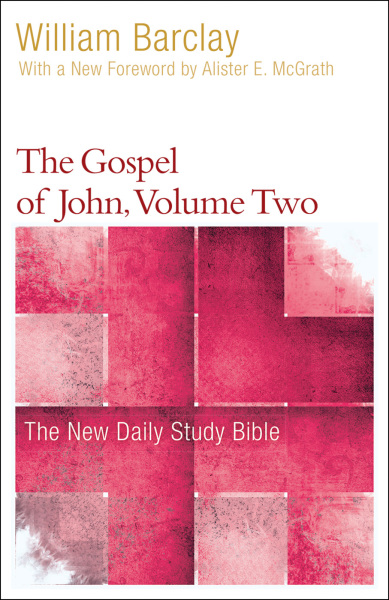
For more than fifty years and for millions of readers around the world, the New Daily Study Bible commentaries have been the ideal help for both devotional and serious Bible study. William Barclay's brilliant communication, down-to-earth approach, and sheer enthusiasm have inspired generations of readers. These new editions contain a new foreword from renowned theologian and author Alister McGrath, along with updated language to clarify less familiar illustrations from the originals and the inclusion of more contemporary language.
Markedly different from the other gospels, The Gospel of John avoids the pithy phrases that identify Matthew, Mark, and Luke. John's thorough and winning, yet confrontational, style is part of the reason that this gospel is considered to be so important within the New Testament. In this second volume of commentary on John, William Barclay explores this gospel's implicit statements and clarifies meaning. Often referred to as the spiritual gospel, it is the book on which, above all, people feed their minds and nourish their hearts, and in which they rest their souls.
William Barclay (1907-1978) is known and loved by millions worldwide as one of the greatest Christian teachers of modern times. His insights into the New Testament, combined with his vibrant writing style, have delighted and enlightened readers of all ages for over half a century. He served for most of his life as Professor of Divinity at the University of Glasgow, and wrote more than fifty books-most of which are still in print today.
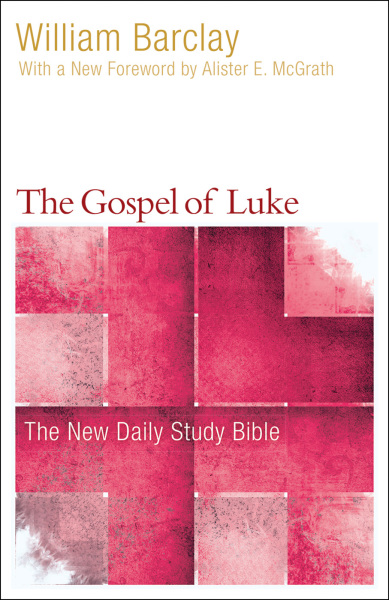
For more than fifty years and for millions of readers around the world, the New Daily Study Bible commentaries have been the ideal help for both devotional and serious Bible study. William Barclay's brilliant communication, down-to-earth approach, and sheer enthusiasm have inspired generations of readers. These new editions contain a new foreword from renowned theologian and author Alister McGrath, along with updated language to clarify less familiar illustrations from the originals and the inclusion of more contemporary language.
With a historian's precision, Luke's Gospel shows painstaking care both in detail and in expression. Of equal distinction is the universal appeal of the Gospel. William Barclay's insightful comments help each of us to see the infinitude of God's love through Luke's eyes.
William Barclay (1907-1978) is known and loved by millions worldwide as one of the greatest Christian teachers of modern times. His insights into the New Testament, combined with his vibrant writing style, have delighted and enlightened readers of all ages for over half a century. He served for most of his life as Professor of Divinity at the University of Glasgow, and wrote more than fifty books-most of which are still in print today.
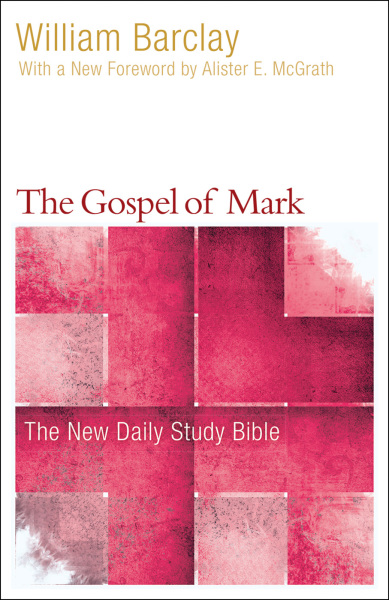
For more than fifty years and for millions of readers around the world, the New Daily Study Bible commentaries have been the ideal help for both devotional and serious Bible study. William Barclay's brilliant communication, down-to-earth approach, and sheer enthusiasm have inspired generations of readers. These new editions contain a new foreword from renowned theologian and author Alister McGrath, along with updated language to clarify less familiar illustrations from the originals and the inclusion of more contemporary language.
In his introduction to this volume, William Barclay explains why the first three Gospels are called "synoptic," how they came to be written, and why many scholars believe that Mark was the first. Barclay's interpretation of the Gospel is full of wisdom, and it offers clear and captivating insight from beginning to end. Having picked up one section to study, the reader will find it difficult to stop reading until the whole volume is completed.
William Barclay (1907-1978) is known and loved by millions worldwide as one of the greatest Christian teachers of modern times. His insights into the New Testament, combined with his vibrant writing style, have delighted and enlightened readers of all ages for over half a century. He served for most of his life as Professor of Divinity at the University of Glasgow, and wrote more than fifty books-most of which are still in print today.
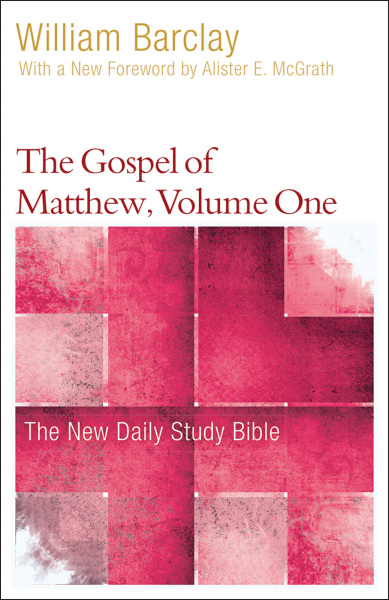
For more than fifty years and for millions of readers around the world, the New Daily Study Bible commentaries have been the ideal help for both devotional and serious Bible study. William Barclay's brilliant communication, down-to-earth approach, and sheer enthusiasm have inspired generations of readers. These new editions contain a new foreword from renowned theologian and author Alister McGrath, along with updated language to clarify less familiar illustrations from the originals and the inclusion of more contemporary language.
Though we find the Gospel of Matthew first in the New Testament, many scholars believe that the Gospel of Mark is older. Matthew then is often seen as an expansion of Mark, incorporating most of the content of Mark while also adding sections that contain the teachings of Jesus, such as the Sermon on the Mount, and stories about the birth and infancy of Jesus. The Gospel of Matthew presents Jesus as one who is ""God with us"" even until the end of time.
William Barclay (1907-1978) is known and loved by millions worldwide as one of the greatest Christian teachers of modern times. His insights into the New Testament, combined with his vibrant writing style, have delighted and enlightened readers of all ages for over half a century. He served for most of his life as Professor of Divinity at the University of Glasgow, and wrote more than fifty books-most of which are still in print today.
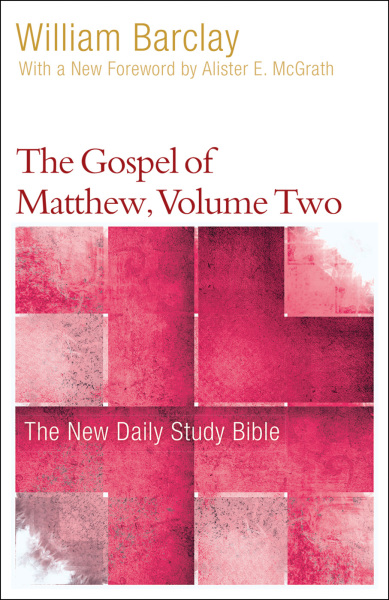
For more than fifty years and for millions of readers around the world, the New Daily Study Bible commentaries have been the ideal help for both devotional and serious Bible study. William Barclay's brilliant communication, down-to-earth approach, and sheer enthusiasm have inspired generations of readers. These new editions contain a new foreword from renowned theologian and author Alister McGrath, along with updated language to clarify less familiar illustrations from the originals and the inclusion of more contemporary language.
Ever question what may have been meant by the statement, "You are Peter and on this rock . . ."? Are you puzzled by the cursing of the fig tree by Jesus or by his comments about moving mountains? William Barclay discusses these and many other interesting matters in this second volume of The Gospel of Matthew. With a lively translation and engaging commentary, Barclay's comments on the latter portion of Matthew's Gospel are great for daily readings.
William Barclay (1907-1978) is known and loved by millions worldwide as one of the greatest Christian teachers of modern times. His insights into the New Testament, combined with his vibrant writing style, have delighted and enlightened readers of all ages for over half a century. He served for most of his life as Professor of Divinity at the University of Glasgow, and wrote more than fifty books-most of which are still in print today.
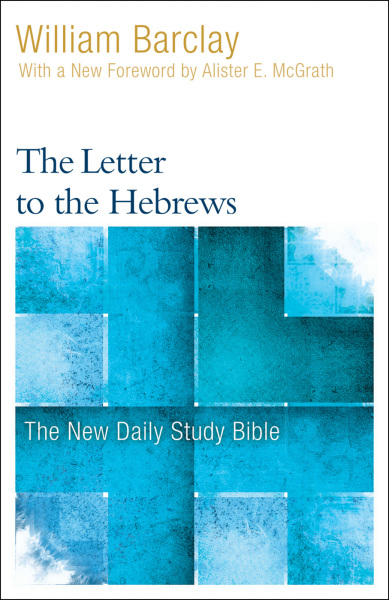
For more than fifty years and for millions of readers around the world, the New Daily Study Bible commentaries have been the ideal help for both devotional and serious Bible study. William Barclay's brilliant communication, down-to-earth approach, and sheer enthusiasm have inspired generations of readers. These new editions contain a new foreword from renowned theologian and author Alister McGrath, along with updated language to clarify less familiar illustrations from the originals and the inclusion of more contemporary language.
At first glance, the letter to the Hebrews can seem difficult to comprehend, but William Barclay believed "that no New Testament book gives us such a glorious picture of Jesus Christ in all the splendor of his manhood and in all the majesty of his deity." So, amplified by Barclay's keen and vibrant commentary, this ancient letter emerges from apparent obscurity to be a vital resource of encouragement for Christians today.
William Barclay (1907-1978) is known and loved by millions worldwide as one of the greatest Christian teachers of modern times. His insights into the New Testament, combined with his vibrant writing style, have delighted and enlightened readers of all ages for over half a century. He served for most of his life as Professor of Divinity at the University of Glasgow, and wrote more than fifty books-most of which are still in print today.
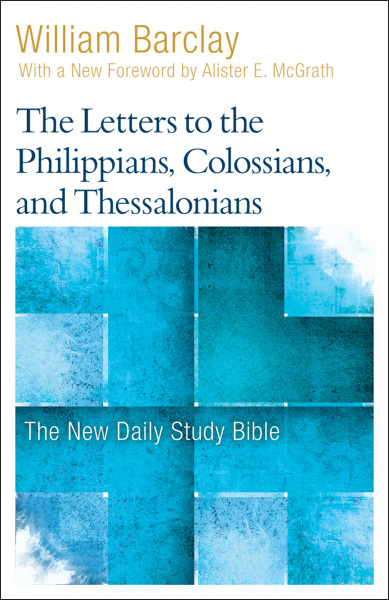
For more than fifty years and for millions of readers around the world, the New Daily Study Bible commentaries have been the ideal help for both devotional and serious Bible study. William Barclay's brilliant communication, down-to-earth approach, and sheer enthusiasm have inspired generations of readers. These new editions contain a new foreword from renowned theologian and author Alister McGrath, along with updated language to clarify less familiar illustrations from the originals and the inclusion of more contemporary language.
Here are William Barclay's offerings on Paul's letters to the Philippians, Colossians, and Thessalonians. Though written to the faithful in years gone by, Paul's words come to life for readers today through Barclay's own translation and enlightening commentary.
William Barclay (1907-1978) is known and loved by millions worldwide as one of the greatest Christian teachers of modern times. His insights into the New Testament, combined with his vibrant writing style, have delighted and enlightened readers of all ages for over half a century. He served for most of his life as Professor of Divinity at the University of Glasgow, and wrote more than fifty books-most of which are still in print today.
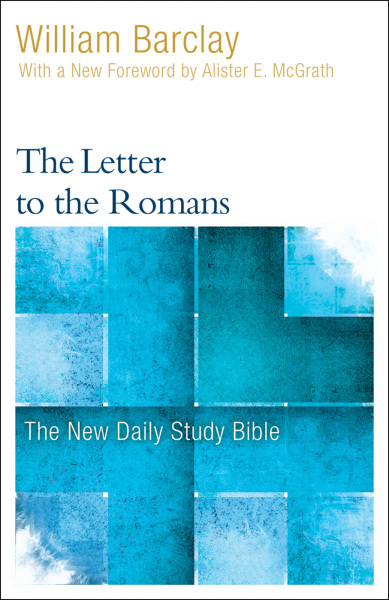
For more than fifty years and for millions of readers around the world, the New Daily Study Bible commentaries have been the ideal help for both devotional and serious Bible study. William Barclay's brilliant communication, down-to-earth approach, and sheer enthusiasm have inspired generations of readers. These new editions contain a new foreword from renowned theologian and author Alister McGrath, along with updated language to clarify less familiar illustrations from the originals and the inclusion of more contemporary language.
In ways that no other writing of the New Testament has achieved, the ideas expressed in the letter to the Romans have shaped formatively the whole of Christian belief. William Barclay's fresh translation and clear exposition allows readers the chance to see the heart of Paul's gospel.
William Barclay (1907-1978) is known and loved by millions worldwide as one of the greatest Christian teachers of modern times. His insights into the New Testament, combined with his vibrant writing style, have delighted and enlightened readers of all ages for over half a century. He served for most of his life as Professor of Divinity at the University of Glasgow, and wrote more than fifty books-most of which are still in print today.
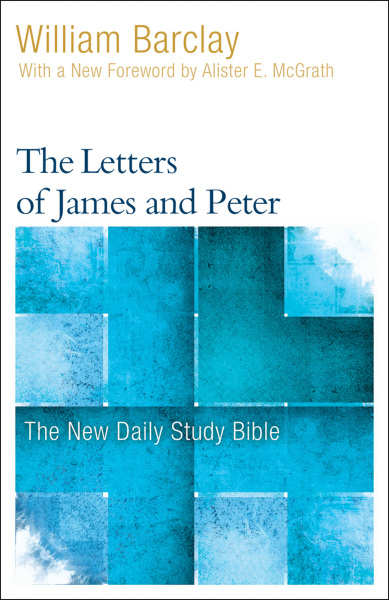
For more than fifty years and for millions of readers around the world, the New Daily Study Bible commentaries have been the ideal help for both devotional and serious Bible study. William Barclay's brilliant communication, down-to-earth approach, and sheer enthusiasm have inspired generations of readers. These new editions contain a new foreword from renowned theologian and author Alister McGrath, along with updated language to clarify less familiar illustrations from the originals and the inclusion of more contemporary language.
Though located in the back part of the New Testament canon, these letters are nonetheless vitally important. As with all of his writings, William Barclay combines both his charm of style and his thoroughgoing scholarship in this volume.
William Barclay (1907-1978) is known and loved by millions worldwide as one of the greatest Christian teachers of modern times. His insights into the New Testament, combined with his vibrant writing style, have delighted and enlightened readers of all ages for over half a century. He served for most of his life as Professor of Divinity at the University of Glasgow, and wrote more than fifty books-most of which are still in print today.
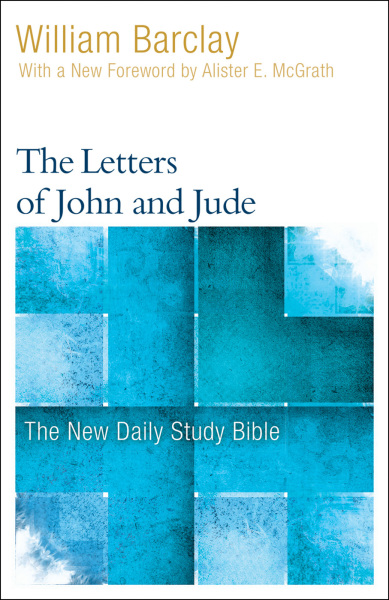
For more than fifty years and for millions of readers around the world, the New Daily Study Bible commentaries have been the ideal help for both devotional and serious Bible study. William Barclay's brilliant communication, down-to-earth approach, and sheer enthusiasm have inspired generations of readers. These new editions contain a new foreword from renowned theologian and author Alister McGrath, along with updated language to clarify less familiar illustrations from the originals and the inclusion of more contemporary language.
The letters of John and Jude deal with heretical teachings within the early church. Here William Barclay uses his characteristically approachable writing style to offer fresh translations and compelling commentary on these texts.
William Barclay (1907-1978) is known and loved by millions worldwide as one of the greatest Christian teachers of modern times. His insights into the New Testament, combined with his vibrant writing style, have delighted and enlightened readers of all ages for over half a century. He served for most of his life as Professor of Divinity at the University of Glasgow, and wrote more than fifty books-most of which are still in print today.
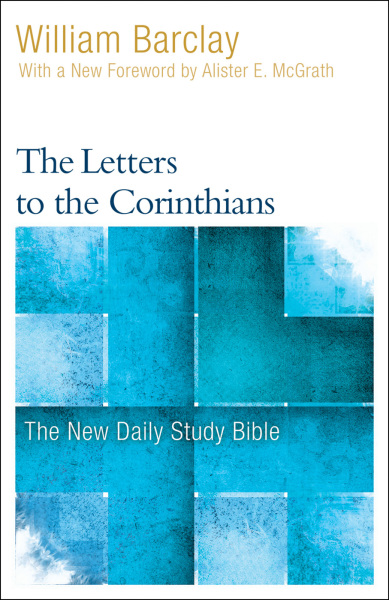
For more than fifty years and for millions of readers around the world, the New Daily Study Bible commentaries have been the ideal help for both devotional and serious Bible study. William Barclay's brilliant communication, down-to-earth approach, and sheer enthusiasm have inspired generations of readers. These new editions contain a new foreword from renowned theologian and author Alister McGrath, along with updated language to clarify less familiar illustrations from the originals and the inclusion of more contemporary language.
Corinth was not only one of the most flourishing commercial centers of the ancient world but also a symbol of vile debauchery. "In this hotbed of vice," writes William Barclay, "some of the greatest work of Paul was done." In his endearing, simple, and illustrative manner, Barclay shows how the message that Paul communicated to the Corinthians continues to help us who live today in the midst of twenty-first century temptations.
William Barclay (1907-1978) is known and loved by millions worldwide as one of the greatest Christian teachers of modern times. His insights into the New Testament, combined with his vibrant writing style, have delighted and enlightened readers of all ages for over half a century. He served for most of his life as Professor of Divinity at the University of Glasgow, and wrote more than fifty books-most of which are still in print today.
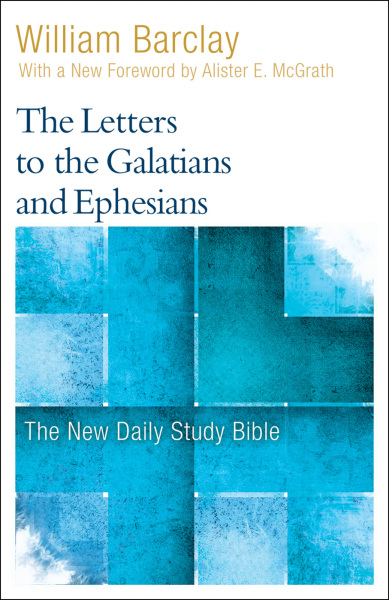
For more than fifty years and for millions of readers around the world, the New Daily Study Bible commentaries have been the ideal help for both devotional and serious Bible study. William Barclay's brilliant communication, down-to-earth approach, and sheer enthusiasm have inspired generations of readers. These new editions contain a new foreword from renowned theologian and author Alister McGrath, along with updated language to clarify less familiar illustrations from the originals and the inclusion of more contemporary language.
Paul wrote the letter to the Galatians to refute a belief that restricted God's grace alone to those who followed Jewish ritualistic law. In the letter to the Ephesians, Paul was more meditative and poetic in his style as he wrestled with problems of good and evil to present that unity will be achieved ultimately when all things are gathered together in Christ. Here William Barclay offers his own translations of these texts, as well as insightful commentaries.
William Barclay (1907-1978) is known and loved by millions worldwide as one of the greatest Christian teachers of modern times. His insights into the New Testament, combined with his vibrant writing style, have delighted and enlightened readers of all ages for over half a century. He served for most of his life as Professor of Divinity at the University of Glasgow, and wrote more than fifty books-most of which are still in print today.
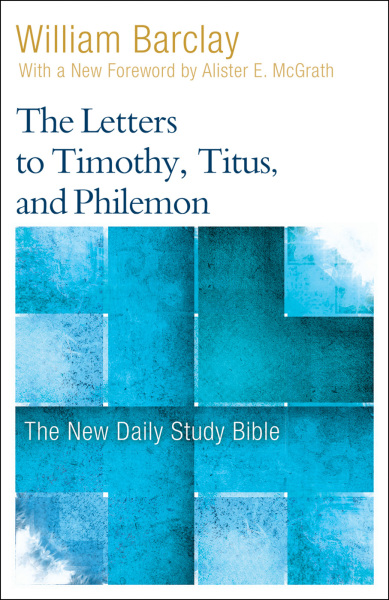
For more than fifty years and for millions of readers around the world, the New Daily Study Bible commentaries have been the ideal help for both devotional and serious Bible study. William Barclay's brilliant communication, down-to-earth approach, and sheer enthusiasm have inspired generations of readers. These new editions contain a new foreword from renowned theologian and author Alister McGrath, along with updated language to clarify less familiar illustrations from the originals and the inclusion of more contemporary language.
These oft-neglected New Testament books deal with topics that should be of great interest to today's readers. As with his other books and about which millions of readers can testify, William Barclay displays a remarkable writing talent that combines a profound mastery of the ancient languages with the wider conversation of secular literature and a deep devotion to scripture.
William Barclay (1907-1978) is known and loved by millions worldwide as one of the greatest Christian teachers of modern times. His insights into the New Testament, combined with his vibrant writing style, have delighted and enlightened readers of all ages for over half a century. He served for most of his life as Professor of Divinity at the University of Glasgow, and wrote more than fifty books-most of which are still in print today.
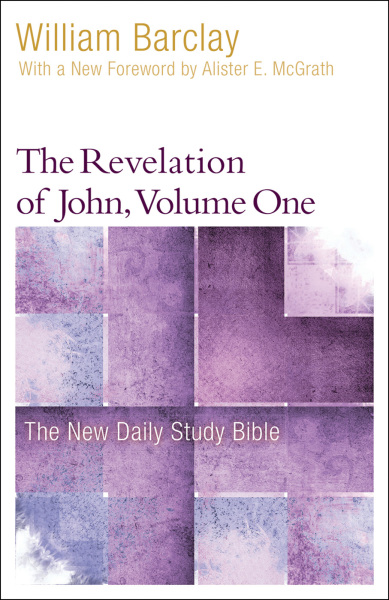
For more than fifty years and for millions of readers around the world, the New Daily Study Bible commentaries have been the ideal help for both devotional and serious Bible study. William Barclay's brilliant communication, down-to-earth approach, and sheer enthusiasm have inspired generations of readers. These new editions contain a new foreword from renowned theologian and author Alister McGrath, along with updated language to clarify less familiar illustrations from the originals and the inclusion of more contemporary language.
In this volume, William Barclay makes the most difficult book in the Bible easier to understand. In his introduction he examines areas such as the characteristics of apocalyptic literature and the nature of Caesar worship. John was, as Barclay shows, "soaked and saturated" in the Old Testament, and most of the imagery he employs is drawn from that source. Barclay clarifies the meaning of this imagery as he covers the central issues of the book of Revelation.
William Barclay (1907-1978) is known and loved by millions worldwide as one of the greatest Christian teachers of modern times. His insights into the New Testament, combined with his vibrant writing style, have delighted and enlightened readers of all ages for over half a century. He served for most of his life as Professor of Divinity at the University of Glasgow, and wrote more than fifty books-most of which are still in print today.
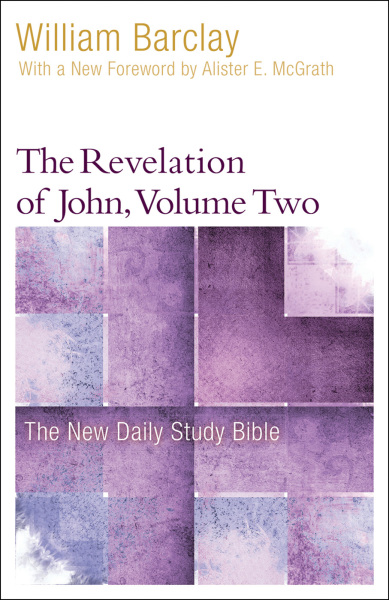
In this volume of the New Daily Study Bible, the reader meets many of the picturesque images that are popularly identified with Revelation--the four horses and their riders, the antichrist, the woman clothed with the sun, the beast with his number, and Armageddon. William Barclay helps the reader understand and interpret these and many other images drawn from Revelation that have so seized hold of the world's imagination.
William Barclay (1907-1978) is known and loved by millions worldwide as one of the greatest Christian teachers of modern times. His insights into the New Testament, combined with his vibrant writing style, have delighted and enlightened readers of all ages for over half a century. He served for most of his life as Professor of Divinity at the University of Glasgow, and wrote more than fifty books-most of which are still in print today.

The letter to the Ephesians provokes an array of interpretive questions regarding authorship, audience, date, occasion, purpose of writing, and the nature of its moral instruction—including its words addressed to slaves and masters. Interacting critically in an arena of intense debate, Lynn Cohick provides an exegetically astute analysis of the six chapters of Ephesians, offering an insightful account of the letter’s theology and soteriology as she attends to its expansive prose and lofty vision of God’s redemption.
Cohick analyzes everything from the letter’s description of the church and its appeals for discipleship to the complex relationship between Jews and gentiles within the text and in the broader cultural context. Her extensive knowledge of the social realities of women and families in the ancient world is also evident throughout. Historically sensitive and theologically rich, Cohick’s commentary will be an abundant resource for a new generation of scholars, pastors, and lay leaders.
Reviews
“Cohick’s scholarship is exceptionally up-to-date, and her text is highly readable and relevant for commentary users interested in the message of Ephesians. She fairly engages other scholars and attends to the grammar and the ancient context, highlighting also ancient social realities that many commentators miss.” — Craig S. Keener, Asbury Theological Seminary
“With an emphasis on cultural backgrounds, New Testament scholar Lynn Cohick offers a fresh exposition of Ephesians that is historically grounded and theologically astute. This commentary should be on the shelf of every pastor, teacher, and student who wants to know not only what Ephesians means, but how its message can be applied to life today.” — Karen H. Jobes, Wheaton College
“Lynn Cohick’s commentary on Ephesians, which clearly and compellingly explicates that which comprises and animates the letter, may be aptly described as a gift to both the church and the academy. Like the vast majority of her interpretive predecessors, Cohick envisions Ephesians as an authentic Pauline letter written by the apostle Paul from Roman captivity in the early 60s CE to gentile Christ followers in the city of Ephesus. Following an expansive, substantive introduction, Cohick patiently and skillfully attends to the literary beauty, theological profundity, and pastoral concerns that pervade Paul’s dearly beloved letter to the Ephesians.” — Todd D. Still, George W. Truett Theological Seminary, Baylor University
Lynn H. Cohick is provost, dean of academic affairs, and professor of New Testament at Northern Seminary. Her other books include Christian Women in the Patristic World, Women in the World of the Earliest Christians, and a commentary on Philippians in the Story of God Bible Commentary series.
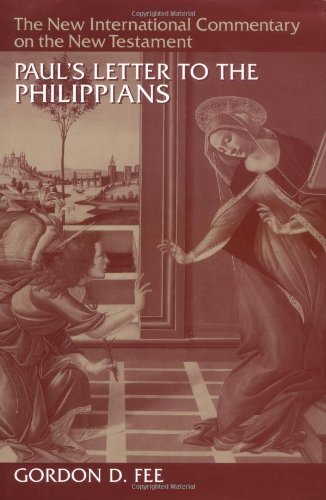
About the New International Commentary on the New Testament
"Faithful criticism" characterizes volumes in The New International Commentary on the New Testament (NICNT), and is widely recognized by pastors, students, and scholars alike for its attention to the text of Scripture, its currency with contemporary scholarship, and its service to the global church.
The interpretive work reflected in these commentaries is based on careful study of the Greek text, but commentary readers need not be practiced in the biblical languages to benefit from them. In the same way, NICNT volumes reflect serious work in technical areas — such as linguistics, textual criticism, and historical concerns — but the commentary itself focuses on understanding the text rather than navigating scholarly debates. Readers can turn to the footnotes and excursuses for more specialized interaction with the Greek text and engagement with critical issues and literature.
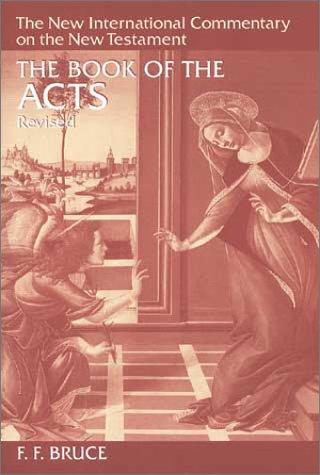
About the New International Commentary on the New Testament
"Faithful criticism" characterizes volumes in The New International Commentary on the New Testament (NICNT), and is widely recognized by pastors, students, and scholars alike for its attention to the text of Scripture, its currency with contemporary scholarship, and its service to the global church.
The interpretive work reflected in these commentaries is based on careful study of the Greek text, but commentary readers need not be practiced in the biblical languages to benefit from them. In the same way, NICNT volumes reflect serious work in technical areas — such as linguistics, textual criticism, and historical concerns — but the commentary itself focuses on understanding the text rather than navigating scholarly debates. Readers can turn to the footnotes and excursuses for more specialized interaction with the Greek text and engagement with critical issues and literature.
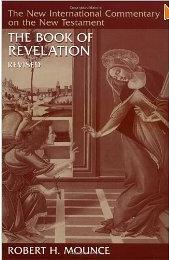
About the New International Commentary on the New Testament
"Faithful criticism" characterizes volumes in The New International Commentary on the New Testament (NICNT), and is widely recognized by pastors, students, and scholars alike for its attention to the text of Scripture, its currency with contemporary scholarship, and its service to the global church.
The interpretive work reflected in these commentaries is based on careful study of the Greek text, but commentary readers need not be practiced in the biblical languages to benefit from them. In the same way, NICNT volumes reflect serious work in technical areas — such as linguistics, textual criticism, and historical concerns — but the commentary itself focuses on understanding the text rather than navigating scholarly debates. Readers can turn to the footnotes and excursuses for more specialized interaction with the Greek text and engagement with critical issues and literature.
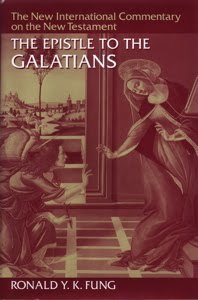
About the New International Commentary on the New Testament
"Faithful criticism" characterizes volumes in The New International Commentary on the New Testament (NICNT), and is widely recognized by pastors, students, and scholars alike for its attention to the text of Scripture, its currency with contemporary scholarship, and its service to the global church.
The interpretive work reflected in these commentaries is based on careful study of the Greek text, but commentary readers need not be practiced in the biblical languages to benefit from them. In the same way, NICNT volumes reflect serious work in technical areas — such as linguistics, textual criticism, and historical concerns — but the commentary itself focuses on understanding the text rather than navigating scholarly debates. Readers can turn to the footnotes and excursuses for more specialized interaction with the Greek text and engagement with critical issues and literature.
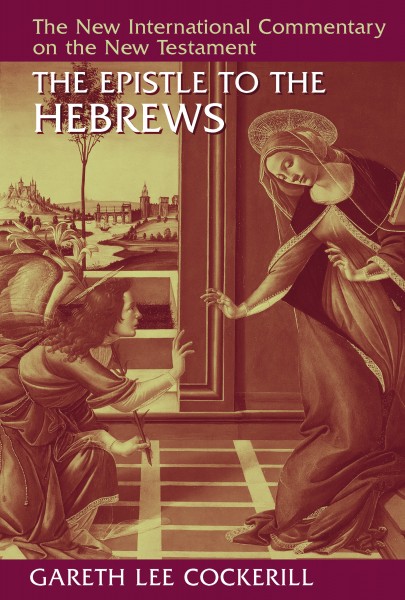
About the New International Commentary on the New Testament
"Faithful criticism" characterizes volumes in The New International Commentary on the New Testament (NICNT), and is widely recognized by pastors, students, and scholars alike for its attention to the text of Scripture, its currency with contemporary scholarship, and its service to the global church.
The interpretive work reflected in these commentaries is based on careful study of the Greek text, but commentary readers need not be practiced in the biblical languages to benefit from them. In the same way, NICNT volumes reflect serious work in technical areas — such as linguistics, textual criticism, and historical concerns — but the commentary itself focuses on understanding the text rather than navigating scholarly debates. Readers can turn to the footnotes and excursuses for more specialized interaction with the Greek text and engagement with critical issues and literature.

For many readers the Epistle to the Hebrews is among the most difficult books of the New Testament. Understanding its message calls for a great familiarity with its Old Testament background and a good knowledge of first-century biblical exegesis. This volume on Hebrews covers both of those fronts. When first published in 1964, Bruce's Hebrews received critical acclaim, and over the years it has become a classic work of evangelical biblical scholarship. Just before his death in 1990, Bruce completed a full revision of the text, incorporating twenty-five years of further study. Every reader of Hebrews -- whether student or scholar, minister or layperson -- will benefit from the careful exegesis and pastoral wisdom distilled in this volume.
About the New International Commentary on the New Testament
"Faithful criticism" characterizes volumes in The New International Commentary on the New Testament (NICNT), and is widely recognized by pastors, students, and scholars alike for its attention to the text of Scripture, its currency with contemporary scholarship, and its service to the global church.
The interpretive work reflected in these commentaries is based on careful study of the Greek text, but commentary readers need not be practiced in the biblical languages to benefit from them. In the same way, NICNT volumes reflect serious work in technical areas — such as linguistics, textual criticism, and historical concerns — but the commentary itself focuses on understanding the text rather than navigating scholarly debates. Readers can turn to the footnotes and excursuses for more specialized interaction with the Greek text and engagement with critical issues and literature.

Paul's letter to the Romans has been called "the quintessence and perfection of saving doctrine." Perhaps the most challenging and thoroughly doctrinal book of the entire New Testament, Romans deals with many issues that are basic to Christian theology and practice. In this volume respected New Testament scholar Douglas J. Moo provides a superb study of Paul's letter to the Roman Christians and restates the enduring message of Romans for Christians today.
Based on the English text but bringing into the discussion the underlying Greek at every point, this commentary focuses both on theological meaning and on contemporary significance. Moo contributes to the continuing debate regarding Paul's teaching on such issues as Jewish law and the relationship between Jews and Gentiles in the people of God. He also critically interacts with "the new perspective on Paul," highlights Romans's emphasis on "practical divinity," and traces the theme of gospel throughout the epistle.
Twelve years in the making and a steady seller during its first decade in print, Moo's Epistle to the Romans will continue to serve as a standard exposition of Romans.
About the New International Commentary on the New Testament
"Faithful criticism" characterizes volumes in The New International Commentary on the New Testament (NICNT), and is widely recognized by pastors, students, and scholars alike for its attention to the text of Scripture, its currency with contemporary scholarship, and its service to the global church.
The interpretive work reflected in these commentaries is based on careful study of the Greek text, but commentary readers need not be practiced in the biblical languages to benefit from them. In the same way, NICNT volumes reflect serious work in technical areas — such as linguistics, textual criticism, and historical concerns — but the commentary itself focuses on understanding the text rather than navigating scholarly debates. Readers can turn to the footnotes and excursuses for more specialized interaction with the Greek text and engagement with critical issues and literature.

The three Epistles of John, according to I. Howard Marshall, are concerned with the fundamentals of Christian belief and life - faith and love. The reader who grasps the message of these short but essential letters will have a sound basis in Christian doctrine. This group of Epistles, says Marshall, is also a good starting point for the study of the Gospel of John. This commentary, then, was written so that students of the Bible might not only master the content of John's Epistles but also better understand Johannine theology as a whole.
The volume includes an "invitation" to general readers and an "introduction" addressed to students and specialists. Another unique feature is a rearrangement of the traditional order of the three letters: 2 John and 3 John are studied before 1 John. This structure assures that the two shorter letters are not relegated to the position of appendices but are treated as important documents of early Christianity in their own right.
About the New International Commentary on the New Testament
"Faithful criticism" characterizes volumes in The New International Commentary on the New Testament (NICNT), and is widely recognized by pastors, students, and scholars alike for its attention to the text of Scripture, its currency with contemporary scholarship, and its service to the global church.
The interpretive work reflected in these commentaries is based on careful study of the Greek text, but commentary readers need not be practiced in the biblical languages to benefit from them. In the same way, NICNT volumes reflect serious work in technical areas — such as linguistics, textual criticism, and historical concerns — but the commentary itself focuses on understanding the text rather than navigating scholarly debates. Readers can turn to the footnotes and excursuses for more specialized interaction with the Greek text and engagement with critical issues and literature.

Comprehensive and accessible, the New International Commentary on the New Testament is one of the most highly regarded resources of current scholarship. Prepared by world-renowned authorities, it reflects exacting study of the original Greek and offers careful exegesis with preachers and teachers concerns in mind. Critical comments are footnoted; grammatical, textual, and historical details are appended.
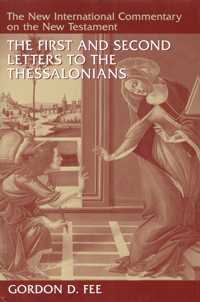
In this commentary Gordon Fee aims first and foremost to offer a fresh exposition of the text of 1 and 2 Thessalonians. He shows the reader what is in the biblical text, what the text meant in the first century, and what it means now. Fee reveals the logic of each argument or narrative before moving on to the details of each verse, and he concludes each section with a theological-practical reflection on the meaning of the text today. Among other things, Fee explores the occasion for writing for each epistle, restoring 2 Thessalonians to the place it deserves as a full companion to the first letter, rather than merely a tagalong to 1 Thessalonians.
About the New International Commentary on the New Testament
"Faithful criticism" characterizes volumes in The New International Commentary on the New Testament (NICNT), and is widely recognized by pastors, students, and scholars alike for its attention to the text of Scripture, its currency with contemporary scholarship, and its service to the global church.
The interpretive work reflected in these commentaries is based on careful study of the Greek text, but commentary readers need not be practiced in the biblical languages to benefit from them. In the same way, NICNT volumes reflect serious work in technical areas — such as linguistics, textual criticism, and historical concerns — but the commentary itself focuses on understanding the text rather than navigating scholarly debates. Readers can turn to the footnotes and excursuses for more specialized interaction with the Greek text and engagement with critical issues and literature.
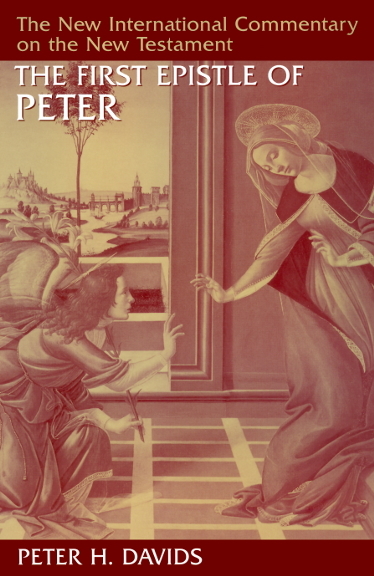
About the New International Commentary on the New Testament
"Faithful criticism" characterizes volumes in The New International Commentary on the New Testament (NICNT), and is widely recognized by pastors, students, and scholars alike for its attention to the text of Scripture, its currency with contemporary scholarship, and its service to the global church.
The interpretive work reflected in these commentaries is based on careful study of the Greek text, but commentary readers need not be practiced in the biblical languages to benefit from them. In the same way, NICNT volumes reflect serious work in technical areas — such as linguistics, textual criticism, and historical concerns — but the commentary itself focuses on understanding the text rather than navigating scholarly debates. Readers can turn to the footnotes and excursuses for more specialized interaction with the Greek text and engagement with critical issues and literature.
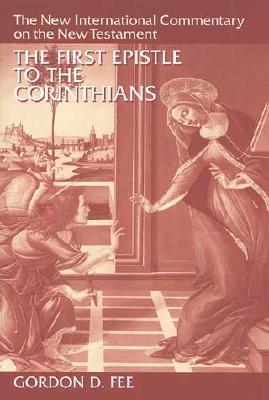
About the New International Commentary on the New Testament
"Faithful criticism" characterizes volumes in The New International Commentary on the New Testament (NICNT), and is widely recognized by pastors, students, and scholars alike for its attention to the text of Scripture, its currency with contemporary scholarship, and its service to the global church.
The interpretive work reflected in these commentaries is based on careful study of the Greek text, but commentary readers need not be practiced in the biblical languages to benefit from them. In the same way, NICNT volumes reflect serious work in technical areas — such as linguistics, textual criticism, and historical concerns — but the commentary itself focuses on understanding the text rather than navigating scholarly debates. Readers can turn to the footnotes and excursuses for more specialized interaction with the Greek text and engagement with critical issues and literature.

This landmark commentary, originally published in 1987, has been lauded as the best study available of Paul's theologically rich first letter to the Corinthians. Writing primarily for pastors, teachers, and students, Gordon Fee offers a readable exposition of 1 Corinthians that clearly describes the meaning of Paul's ideas and their larger theological relevance.
Fee's revised edition is based on the improved, updated (2011) edition of the NIV, and it takes into account the considerable scholarship on 1 Corinthians over the past twenty-five years. Fee has also eliminated "chapter and verse" language — totally foreign to Paul's first-century letter — relegating the necessary numbers for "finding things" to parentheses.
About the New International Commentary on the New Testament
"Faithful criticism" characterizes volumes in The New International Commentary on the New Testament (NICNT), and is widely recognized by pastors, students, and scholars alike for its attention to the text of Scripture, its currency with contemporary scholarship, and its service to the global church.
The interpretive work reflected in these commentaries is based on careful study of the Greek text, but commentary readers need not be practiced in the biblical languages to benefit from them. In the same way, NICNT volumes reflect serious work in technical areas — such as linguistics, textual criticism, and historical concerns — but the commentary itself focuses on understanding the text rather than navigating scholarly debates. Readers can turn to the footnotes and excursuses for more specialized interaction with the Greek text and engagement with critical issues and literature.

In this detailed, elegantly written commentary J. Ramsey Michaels gives primary attention to the Gospel of John in its present form rather than to the sources or traditions behind it. Michaels examines both the Gospel's literary character and its theological significance for the Christian community in its own time and through the ages. This landmark commentary -- seventeen years in the making, reflecting fifty years of classroom teaching, and packed with fresh insights -- will prove highly useful to scholars, students, and, especially, pastors.
"Here is a substantial, truly original exposition of extraordinary insight and helpfulness to pastor and scholar alike, which should have a considerable life span after both the author and editor have gone to their eternal reward."
-- Gordon D. Fee (from editor's preface)
About the New International Commentary on the New Testament
"Faithful criticism" characterizes volumes in The New International Commentary on the New Testament (NICNT), and is widely recognized by pastors, students, and scholars alike for its attention to the text of Scripture, its currency with contemporary scholarship, and its service to the global church.
The interpretive work reflected in these commentaries is based on careful study of the Greek text, but commentary readers need not be practiced in the biblical languages to benefit from them. In the same way, NICNT volumes reflect serious work in technical areas — such as linguistics, textual criticism, and historical concerns — but the commentary itself focuses on understanding the text rather than navigating scholarly debates. Readers can turn to the footnotes and excursuses for more specialized interaction with the Greek text and engagement with critical issues and literature.






- Adapt your commentary collection month-to-month based on the book or books you are studying.
- Build your commentary library strategically without hundreds of dollars of upfront investment.
- Never get stuck with commentaries you rarely use - swap them out each month as your needs change.



